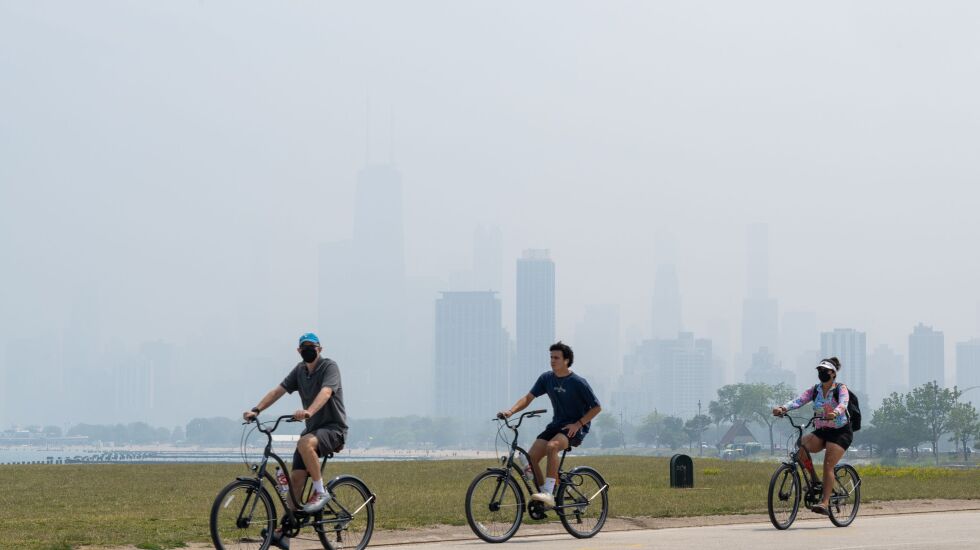
The government’s warning this week that air in and around Chicago was “very unhealthy” marked a rare occurrence in the city, meaning the pollution is so bad it can make you sick.
The cause of the problem lies in the Canadian wilderness, where 19.5 million acres — the equivalent of more than half of Illinois — is on fire and sending smoke spreading across the Midwest.
What’s in the air, why is it bad for us?
The pollution we’re breathing is a toxic brew of microscopic contaminants caused by the fires. It’s known as “particulate matter 2.5,” and it’s different from the high levels of ozone pollution we’re used to breathing.
Both types of pollution are very bad for your health.
Also known as fine particulate matter, it’s a catchall term to describe the tiny contaminants that, inhaled, lodge deep in the lungs and can cause problems with breathing. Exposure can lead to a range of problems, from minor lung irritation to heart attacks.
“Think of them as an assault on our respiratory system and cardiovascular system,” said Vijay Limaye, a senior scientist with the Natural Resources Defense Council in Madison, Wisconsin.
Is Chicago’s air normally clean?
Chicago’s air is normally more polluted than many areas of the country, violates federal law on ozone pollution, and it’s been that way for years.
Though the air isn’t as dirty as it was decades ago, federal rules on pollution have become more strict over the years, and the Chicago area has never been able to meet the clean air standard, said Brian Urbaszewski, environmental health director for the Respiratory Health Association in Chicago.
The Canadian smoke adds another level of air pollution in Chicago. During summers, old, young and sick people in Chicago often are advised to take precautions because of ozone pollution, which is caused by a reaction between chemicals, fossil-fuel emissions and sunlight.
But Wednesday Chicagoans faced a double threat. The government declared the air “very unhealthy” — a rare declaration for Chicago — because of particulate pollution and “unhealthy for sensitive groups” for ozone pollution.
Chicago will likely see some additional negative effects later this summer from forest fires in the western United States, which have intensified over recent decades. Some health and environmental advocates say this could be a “new normal.”
What about climate change?
“We need to be connecting the dots between climate change and the future that we want,” Limaye said. “We don’t want to live with future summers that look like this. We’re all pretty much stuck inside.”
Mariah Mata, who lives in Pilsen, is studying for the bar and hopes to practice environmental law. She also hopes that the air warnings bring attention to a long-running pollution problem in Chicago. On the Southwest Side, Mata said, “Communities have been screaming about this” and more urgent attention is needed.
Brett Chase’s reporting on the environment and public health is made possible by a grant from The Chicago Community Trust.







